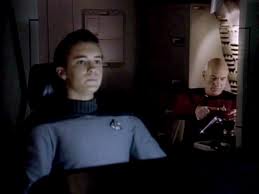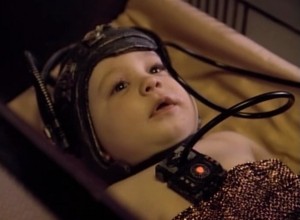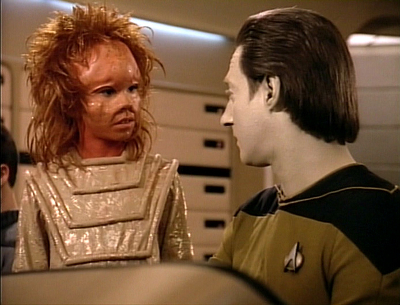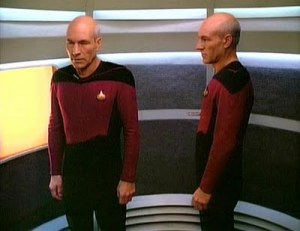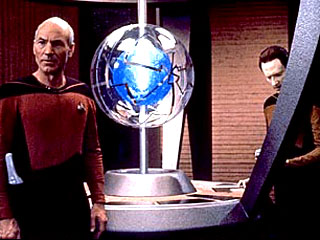I’m examining the impact Star Trek: The Next Generation had on my formation. The introduction to this series can be seen here.
The Measure of a Man
A Starfleet scientist orders Data to submit himself to dismantling and study, so more androids may be produced. When Data refuses, a hearing is held to determine his legal rights, and the very nature of his personhood.
This episode is a masterpiece, one of the high points of the entire Star Trek universe. And because of its content, it’s near and dear to my heart. Data’s trial is a remarkable look at prejudice, objectification, individual agency, the definition and sacredness of life and the power we wield when we define one another. At the time it boggled my mind and resonated deeply with me, in ways I wouldn’t fully understand for years. It was this story that began unlocking my understanding of privilege, normativity and invisibility before I ever learned those words.
There are five key characters here, each with a rich context and complicated set of responses and decisions to make.
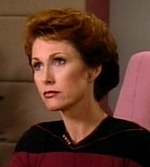 When we first meet Judge Phillipa Louvois, she is unfamiliar with Data, and casually assumes he has no more self-awareness than a starship computer does. She is not an ally, but not out of intentional malice. She simply has the privilege to not care much about Data’s reality, even while she holds his fate in her hands. Picard has some sort of very complicated history with her; they flirt and argue, and refer to an obviously painful trial they were both involved in. Picard accuses her at one point of being more interested in the adversarial process than using the court system to get at the truth. This glimpse at the motives of the most powerful person in the room is quite disturbing, and quickly demolishes the illusion of any objectivity in this process.
When we first meet Judge Phillipa Louvois, she is unfamiliar with Data, and casually assumes he has no more self-awareness than a starship computer does. She is not an ally, but not out of intentional malice. She simply has the privilege to not care much about Data’s reality, even while she holds his fate in her hands. Picard has some sort of very complicated history with her; they flirt and argue, and refer to an obviously painful trial they were both involved in. Picard accuses her at one point of being more interested in the adversarial process than using the court system to get at the truth. This glimpse at the motives of the most powerful person in the room is quite disturbing, and quickly demolishes the illusion of any objectivity in this process.
Her prejudice is clear when she punctuates one of her preliminary rulings with the phrase “Data’s a toaster.†With this quick decision, she carelessly ignores Starfleet’s two previous judgements of Data, when he entered the academy and when they made him an officer… neither achievement available to nonsentient creatures. Most disturbingly, at one point, she responds to the real danger to Data with the argument that “we all knew there would be risk when we signed up.” She’s equating danger from one’s own commanding officers – in one’s own “home” and familial community, for all intents and purposes – to the external, unknown risks inherent to exploration, as though they bear the same moral and legal weight. With this, she suggests that the consent given by individual participants in Starfleet absolves the command structure of reflecting critically on their treatment of their own people. There is no sacred trust visible in her definition of this community. I wish I could say this myopic attitude from a large and powerful organization is not based thoroughly in human reality. But experiencing it here at fourteen at least gave me some small voice, some small vision to be able to understand it when I encountered it — from government structures, from educational structures, from collegial structures (even those dedicated to God). It also mirrors the kyriarchal assumptions that make so many families unsafe places for their members.
Louvois has one small, telling, learning moment. As Picard asks a question meant to reveal Data’s previous sexual relationship with Tasha, and Data discretely confirms their history, Louvois is shown as visibly taken aback. The fact that he has a sex life appears to surprise her… and I suspect it “humanizes” him in her eyes as few other things might. I am appreciative of this embedded valuing of sex and sexuality as things that make us “humanâ€.
Ultimately, Louvois rules for Data, based mostly on what she doesn’t know and doesn’t understand about him, deliberately choosing to give Data the freedom to grow and discover answers for himself. I was very aware of the disturbing nature of this “freedom”: bestowed only because he had friends willing to fight for him, and because this single judge decided he could have it. Having this arbitrariness of the “justice†system present in a sacred story of mine made it easier for me to see and understand when others alerted me to its presence in this world.
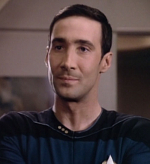 Commander Bruce Maddox is the cyberneticist who hasn’t really done his homework, and wishes to dismantle and study Data as a shortcut to understanding positronic brains. Maddox aggressively objectifies Data, and has a history of doing so: he opposed Data’s entry to Starfleet, believing that he was not and is not sentient. He rarely engages Data directly, and instead explains what he will be doing to Data to those he believes may have a claim on him as property. He refers to him as one would an object, using “this” and “it”. At one point, he stumbles into Data’s private belongings; he automatically and casually rifles through them, making it clear that he doesn’t conceptualize Data as having any sense of meaning or privacy (elements of basic personhood). He assumes those who advocate for Data must be acting from anthropomorphism; Maddox is convinced Data’s allies only presume his personhood because of the shape of his body (“If it were a box on wheels, I would not be facing this opposition.”)
Commander Bruce Maddox is the cyberneticist who hasn’t really done his homework, and wishes to dismantle and study Data as a shortcut to understanding positronic brains. Maddox aggressively objectifies Data, and has a history of doing so: he opposed Data’s entry to Starfleet, believing that he was not and is not sentient. He rarely engages Data directly, and instead explains what he will be doing to Data to those he believes may have a claim on him as property. He refers to him as one would an object, using “this” and “it”. At one point, he stumbles into Data’s private belongings; he automatically and casually rifles through them, making it clear that he doesn’t conceptualize Data as having any sense of meaning or privacy (elements of basic personhood). He assumes those who advocate for Data must be acting from anthropomorphism; Maddox is convinced Data’s allies only presume his personhood because of the shape of his body (“If it were a box on wheels, I would not be facing this opposition.”)
Maddox’s eventual response to all this inconvenient advocating on Data’s behalf is another telling moment in the script: “Rights, rights. I’m sick to death of hearing about rights. What about my right not to have my life work subverted by blind ignorance?” Somehow, he values his career far higher than Data’s right to exist.
At fourteen, I thought to myself, “Why is he being allowed to do this??” I still believe that’s the pertinent question, for it is not the prejudice itself that is dangerous to Data, but the power being lent it. If Maddox were not supported and encouraged by the system that he and Data live within – if there were not a whole chain of people that have confirmed and allowed the original transfer order, and a lack of any official advocacy on Data’s behalf when he questions its appropriateness – the harm to Data would be on a far lesser scale. The danger is in the weight of the assumptions that support Maddox: the system is built by humans, for humans, and Data is not human.
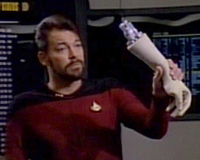 Because of a particular set of circumstances/plot devices, Riker must prosecute his friend Data’s case, for Data to receive a trial at all and avoid summary condemnation. Riker reluctantly agrees to the distressing role, and presents a case that “dehumanizes” his friend, for lack of a better word. His case consists of:
Because of a particular set of circumstances/plot devices, Riker must prosecute his friend Data’s case, for Data to receive a trial at all and avoid summary condemnation. Riker reluctantly agrees to the distressing role, and presents a case that “dehumanizes” his friend, for lack of a better word. His case consists of:
1) listing Data’s data storage and computational speed, in order to other him, and strengthen the connection between Data and other computers (ignoring the difference of sentience)
2) creating an exhibition of Data’s profound strength. Again this others him, providing only evidence that he is different from humans, not addressing any issues of agency or sentience.
3) equating Data with the (Webster’s!) dictionary definition of “automaton”, without proving it, and simply stating Data’s purpose is to serve human needs and interests.
Riker does not offer any evidence directly questioning Data’s agency. The frightening thing – then and now – is that he doesn’t have to. In an adversarial system, he plays on xenophobia and privilege and employs rhetorical tricks and dramatic effect to create a damning case that could easily cement the already-present species-ism of the judge. It’s clear that Data is at the mercy of a system created to serve others, not him.
On a more personal character note, Riker is consistently, visibly wounded by being forced into this position. It is only later reassurances of his friend’s forgiveness that alleviates his pain. This is one of the few times so far I’ve felt an emotional connection to Riker.
Captain Picard doesn’t begin with a full comprehension of the situation. He and Data have the following exchange early in the episode:
Picard: Data… I understand your objections. But I have to consider Starfleet’s interests. What if Commander Maddox is correct? There is a possibility that many more beings like yourself can be constructed.
Data: Sir, Lieutenant La Forge’s eyes are far superior to human biological eyes, true?
Picard: M-hm.
Data: Then why are not all human officers required to have their eyes replaced with cybernetic implants?
[Picard considers this shortly, then looks away without giving an answer]
Data: I see. It is precisely because I am *not* human.
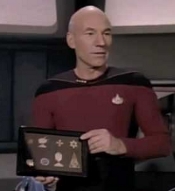 Once again, Picard is teachable, a virtue I greatly admire. Data’s analogy seems to drive home for Picard what is being demanded of Data, and the belittling of him inherent in the situation. Picard has already become Data’s loudest (and most powerful) advocate before he is officially assigned to his friend’s defense in the trial.
Once again, Picard is teachable, a virtue I greatly admire. Data’s analogy seems to drive home for Picard what is being demanded of Data, and the belittling of him inherent in the situation. Picard has already become Data’s loudest (and most powerful) advocate before he is officially assigned to his friend’s defense in the trial.
Picard’s case is also threefold. First, he plays on the emotions Riker stirred, and directly combats elements of xenophobia in the trial. He builds similarities between Data and the rest of them by reminding the court that humans are machines as well, and by discussing Data’s medals, achievements, and valued personal belongings. He thus “humanizes†Data.
This last element of Data’s personal belongings leads into Picard’s second point, and plays a dual role: it draws parallels between Data and humans, and also highlights his meaning-making, which reflects on his sentience and distinguishes him from other computers. Data keeps items that remind him of friends, which defines a part of his selfhood: his ability to connect and build relationships with others. Using this and other evidence, Picard establishes Data meeting two of Maddox’s three criteria for sentience: intelligence and self-awareness. He challenges the court on how certain they can be that Data doesn’t meet the third criteria: consciousness.
Finally, Picard takes Maddox’s stated goal – to make many more androids – and takes it to its logical conclusion. Data is a single new life, something Starfleet is charged to seek out. If there are more Datas, he becomes a race, and this decision the judge is making will have repercussions for the agency and dignity of an entire group of beings. Declaring Data property would extrapolate to enslavement of an entire group of beings, a fact somehow easier to see and more terrifying when applied to groups instead of an individual. Picard finally rightly emphasizes that this decision will be redefining personal liberty.
Picard’s compassion for Data and his passion to secure proper treatment of him and others like him was overwhelmingly wonderful to young me. I’ve known his advocacy here was a huge part of my emotional connection to him. But, even then, I had some inkling of what it would have meant to Data were he under someone else’s command. I am glad for the truths Picard gave voice to – for the ways he lends his voice to Data – but the arbitrariness of this opportunity, and Data’s lack of any voice at all, weighed on me.
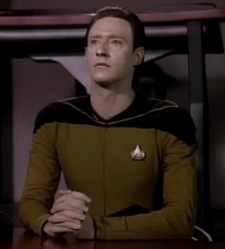 Finally, there is Data, and this episode is a unique glimpse into his inner workings. When he first discusses resigning to preserve himself, he articulates that he does so to protect the uniqueness of his creator’s work… or, more personally, to “protect his dreamâ€. Data says, “…when Dr. Soong created me, he added to the substance of the universe. If, by your experiments, I am destroyed, something unique, something wonderful will be lost. I cannot permit that.†I must admit, I am amused to realize only now that this very personal insight from a character I have long loved bears such a resemblance to my own adult values. There are certain values of nonviolence and compassion that are more important to me than self-preservation. However, my own survival instinct thrives, and has only become stronger and fuller with my deepening understanding of how I have been fearfully and wonderfully made by my Creator. I too believe my Creator adds something unique and wonderful to the substance of the universe with each creation. Data and I obviously have a different relationship to death, as he could conceivably continue living indefinitely. But this connection to the “dream†of our respective creators is something we share. Noticing this now makes me wonder how much of a role model Data became for me, without my realizing.
Finally, there is Data, and this episode is a unique glimpse into his inner workings. When he first discusses resigning to preserve himself, he articulates that he does so to protect the uniqueness of his creator’s work… or, more personally, to “protect his dreamâ€. Data says, “…when Dr. Soong created me, he added to the substance of the universe. If, by your experiments, I am destroyed, something unique, something wonderful will be lost. I cannot permit that.†I must admit, I am amused to realize only now that this very personal insight from a character I have long loved bears such a resemblance to my own adult values. There are certain values of nonviolence and compassion that are more important to me than self-preservation. However, my own survival instinct thrives, and has only become stronger and fuller with my deepening understanding of how I have been fearfully and wonderfully made by my Creator. I too believe my Creator adds something unique and wonderful to the substance of the universe with each creation. Data and I obviously have a different relationship to death, as he could conceivably continue living indefinitely. But this connection to the “dream†of our respective creators is something we share. Noticing this now makes me wonder how much of a role model Data became for me, without my realizing.
When Maddox insists Data’s memory banks would be downloaded safely into a mainframe, Data explains that there is an ineffable quality to memory, and that the flavor of his memories could be lost. This is one of the few times we’ve heard Data refer to his own uniqueness as something ineffable or abstract. As an audience member that admires and cares for him, it was and is gratifying to me to hear him understand something of his own specialness and sacred particularity.
After the trial, Data offers to work with Maddox in the future, once he has proven himself to be sufficiently prepared for the work. I admire his capacity for and modeling of forgiveness and right relationship. He holds no ill will toward Maddox, only a practical understanding of the consequences of his actions. He makes himself open to further relationship — not if it will be harmful, but with the stipulation that Maddox is ready to engage with him in a way that honors them both. Data says to him, “When you are ready, I will still be here.†To me, this kind of boundary-drawing is an issue critical to authentic forgiveness and rebuilding broken relationships. And I can’t imagine I’d seen many examples of it before this moment.
Finally, Data seeks Riker out after the trial. When he hears Riker’s pain at nearly being successful in his role, Data explains to him that “the action injured you, and saved me. I will not forget it.†His ability to reframe makes all the difference to his friend, changing what could have eaten away at Riker into a burden he was able to carry to help save Data. Data’s interpretation is a noble and compassionate act.
Though he is dispassionate, and overtly names himself as such, Data is still emphatic about what he values, and intent on living by his principles. Though I couldn’t have quite named it yet when I saw this episode, he is one of my earliest examples of a gentle and virtuous person, and his example would stick with me and be mirrored in other models of virtue throughout my life.
As I’ve mentioned before – and as is clear from the fact that Data wasn’t dismantled – the judge ultimately rules in favor of Data. She begs off determining the nature of his selfhood, believing she’s being asked questions “best left to saints and philosophers,†as though the legislation of people’s lives can escape such questions. She still refers to him as an “it†as she begins speaking, and names him a machine, but she denies that he is the property of Starfleet. She says,
We have all been dancing around the basic issue: does Data have a soul? I don’t know that he has. I don’t know that I have. But I have got to give him the freedom to explore that question himself. It is the ruling of this court that Lieutenant Commander Data has the freedom to choose.
Is it necessary to resort to language of a soul, to understand Data’s agency? I don’t believe so. In evoking this language, I believe she is looking to quantify how Data is different, and see how he fits into the normativity established without him in mind. She’s trying to decide whether he deserves the rights assumed to be true of the rest of the (white, able-bodied, human) people around the table. Maddox’ assumption that he has power over Data’s life never has to be proven. His claim is a given, and is enforced by both passionate prejudice and by the casual ignorance of the powerful. Data must prove his “right†to not just a place at the table with them, but the right to exist at all, and his fight is against a huge system that by its very nature others him.6 He must try to prove that they have no claim on his very selfhood, as they assume they do. Isn’t this the way basic human rights often work? Haven’t countless groups over the years continued to exist only at the whim of others? Haven’t civil rights movements often been about the ability simply to live as one chooses, without the majority group interfering and laying claim to portions of a person’s life and dignity?
Because of Data’s differences, he cannot lay claim to his own self. It’s not enough for him to speak and say “I do not wish to do that.†He is in a system that will – by force and coercion – inflict its will on him. Yes, he fought and won this time. There have been and will be other battles like this one for Data too. Humans don’t have to prove their own sentience; it’s a given. But Data does have to prove it, repeatedly. His worth can be questioned just this easily, with a transfer order casually handed to Captain Picard. Even the language used – in the episode and by me here – values humanness over other kinds of beingness. The emotional weight of phrases like “that made him seem more human†and “knowing that about him humanizes him in my eyes†embues the word “human†with an emotional quality not afforded to androids, Vulcans, or other nonhuman beings. I began to become aware of the biases inherent in language this early in my life, thanks to Star Trek and a likeable android. I would soon realize that the common definitions of “human†vs “animalistic†made objectification of animals that much easier. I would eventually notice how language undergirds heteronormativity, mononormativity, cisnormativity and more, as I noticed more and more differences between beings, and how those differences are used not just to other and alienate, but to forcibly lay claim to the flesh of others. I would come to see how language can reveal or make invisible… how it can sustain life or be wielded as a weapon.
My understanding of systemic oppression and evil, of language and how it interacts with that system, of the uniqueness and sacredness of personhood, began here with Data and his struggle to be.
1. Image of Louvois from http://starbaseadran.co.uk/data-s03-epi-0035.html
2. Image of Maddox from http://en.memory-alpha.org/wiki/Category:Memory_Alpha_images_by_episode_%28TNG:_The_Measure_Of_A_Man%29
3. Image of Riker from http://memory-beta.wikia.com/wiki/The_Measure_of_a_Man
4. Image of Picard from World News Search
5. Image of Data from http://www.aplvblog.com/2012/04/review-top-ten-star-trek-next.html
6. These two different approaches to queer rights have a tangled history in my own life, and I believe they are the root of a lot of confusion and cross-purposes in the current conversations about advocacy among queer folk. One example would be those who fight for “a place at the table” in the form of marriage equality for mononormative gay couples, and those who are angry that the marriage issue is eclipsing the struggle for other groups to merely survive, and outwit the destructive powers that press on them.
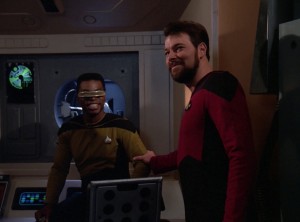
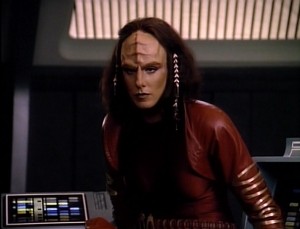
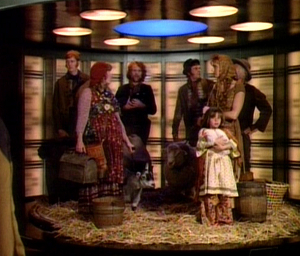 The reason I write about it here is that unquestionable taboos and heresies really intrigue me. As many times as Star Trek might have given me an opportunity to question my assumptions, it’s still written by humans, with certain values they won’t question and certain gaps in their self-analysis. Here, the issue is cloning. The second colony, comprised of scientists with great technology in tow, survived early devastating losses of population by cloning themselves and have in fact developed a distaste for sexual reproduction. They ask the Enterprise crew to donate DNA for cloning to help the colony survive certain survival-threatening limitations they’ve run into. Picard and company flat out refuse. It’s apparently a taboo subject. It seems that no one on board beyond the present away team is even asked whether they would want to contribute. The strategy that the colony itself has decided would be best for its survival is categorically rejected before discussion, and before consenting contributors are even sought out. There is, to my knowledge, no Federation law that would keep a consenting crew member from donating. But in place of asking, Picard explicitly states that it’s not likely anyone will want to. Riker passionately names individuality as an important value to him, and defines cloning as being in opposition to that. He believes having a clone would inherently diminish him. Picard seems to concur without discussion, and that’s that. There is no further exploration of the subject.
The reason I write about it here is that unquestionable taboos and heresies really intrigue me. As many times as Star Trek might have given me an opportunity to question my assumptions, it’s still written by humans, with certain values they won’t question and certain gaps in their self-analysis. Here, the issue is cloning. The second colony, comprised of scientists with great technology in tow, survived early devastating losses of population by cloning themselves and have in fact developed a distaste for sexual reproduction. They ask the Enterprise crew to donate DNA for cloning to help the colony survive certain survival-threatening limitations they’ve run into. Picard and company flat out refuse. It’s apparently a taboo subject. It seems that no one on board beyond the present away team is even asked whether they would want to contribute. The strategy that the colony itself has decided would be best for its survival is categorically rejected before discussion, and before consenting contributors are even sought out. There is, to my knowledge, no Federation law that would keep a consenting crew member from donating. But in place of asking, Picard explicitly states that it’s not likely anyone will want to. Riker passionately names individuality as an important value to him, and defines cloning as being in opposition to that. He believes having a clone would inherently diminish him. Picard seems to concur without discussion, and that’s that. There is no further exploration of the subject.
